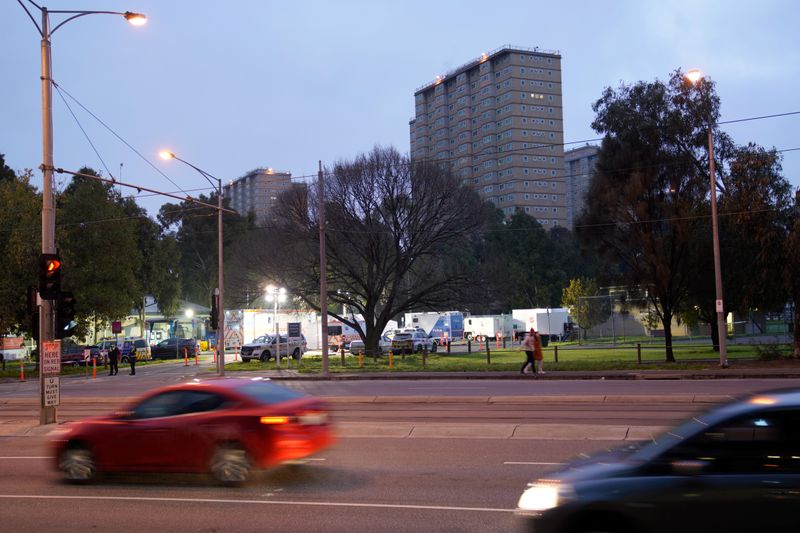By Colin Packham and Byron Kaye
SYDNEY (Reuters) - Australia should slow down the return of its citizens from abroad, Prime Minister Scott Morrison said on Wednesday, as the country grapples with a fresh coronavirus outbreak that has forced it to isolate its second most populous state.
The border between Victoria and New South Wales, the busiest in the country, was closed overnight and around 4.9 million residents in the Victorian capital of Melbourne will return to partial lockdown at midnight following a spike in COVID-19 cases in the city.
"The rest of the country knows that the sacrifice that you're going through right now is not just for you and your own family, but it's for the broader Australian community," Morrison said during a televised media conference.
Morrison said he would take a proposal to a national cabinet of state and territory leaders on Friday, seeking to slow down the return of Australian citizens and permanent residents by reducing the number of repatriation flights. The two groups have been the only arrivals allowed since Australia closed its international border in March.
Neighbouring New Zealand announced on Tuesday that its national airline will not take new inbound bookings for three weeks to reduce the burden on overflowing quarantine facilities.
In Australia, red flags have been raised by potential quarantine breaches that the Victorian state government believes led to returnees spreading the virus. Officials have begun an inquiry.
Victoria reported 134 new infections on Wednesday, down from the previous day's record 191 but well over the low single digit daily increases of the country's other seven states and territories.
Fears of a broader second wave were underscored on Thursday by an official report of three new COVID-19 cases in the national capital, Canberra. Two of the infected people had returned from Melbourne last week, and the third was their housemate.
In Sydney, authorities were scrambling to track down 48 passengers who were allowed to disembark a flight from Melbourne overnight without being checked for COVID-19 symptoms.
The resurgence of the virus deals a blow to Australia's hopes of cushioning its landing as it sinks into its first recession in three decades. Federal Treasurer Josh Frydenberg said the border closure and Melbourne lockdown would cost the economy up to A$1 billion ($700 million) per week.
Morrison said the government would offer additional income support beyond a wage subsidy currently due to end in September, while Frydenberg said income tax cuts may be accelerated.
BORDER CONTROL
At the Victoria and NSW border, police checkpoints caused delays of more than an hour for drivers. The state line is heavily trafficked by daily commuters who live and work on either side.
"I got a permit but with all the checks, my commute across was heavily delayed," Amanda Cohn, who crosses the border from her home in NSW each day to reach the Victorian hospital where she works, told Reuters. "Plenty of others need to get across and they don't have a permit."
Authorities had hastily set up a system to issue travel permits for a select group, but a website created to dispense passes crashed soon after its launch.
Victoria's only other internal border, with South Australia, has been closed since mid-March.
In Melbourne, renewed lockdown measures will kick in at midnight for at least six weeks, closing down cafes, bars, restaurants and gyms, and confining residents to their homes except for essential business.
Among the new COVID-19 cases on Wednesday were 75 occupants of nine public housing towers that were earlier this week placed into complete lockdown, barring their 3,000 residents from leaving for five days.
Nationwide, Australia has reported about 9,000 COVID-19 cases and 106 deaths from the virus.

($1 = 1.4399 Australian dollars)